

Social Media Bites! Gwittr - Quick Smart Twitter Search. We know what you're doing... A social networking privacy experiment by Callum Haywood. ESafety and Digital Citizenship. Google adds in-depth articles to results. Google is rolling out a new addition to search results called “In-depth articles” ( “To understand a broad topic, sometimes you need more than a quick answer.
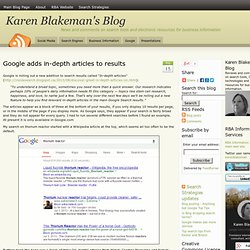
Our research indicates perhaps 10% of people’s daily information needs fit this category — topics like stem cell research, happiness, and love, to name just a few. That’s why over the next few days we’ll be rolling out a new feature to help you find relevant in-depth articles in the main Google Search results.” The articles appear as a block of three at the bottom of your results, if you only display 10 results per page, or in the middle of the page if you display more.
As Google says, they appear if your search is fairly broad and they do not appear for every query. My search on thorium reactor started with a Wikipedia article at the top, which seems all too often to be the default. Further down the page was a block of three “in-depth” articles from Wired, Cosmos Magazine and Nature. Becoming a Networked Researcher: a suite useful of presentations. Web 2.0 tools have finally moved firmly beyond the ‘potential fad’ stage, to gaining widespread acceptance as valuable weapons in the Researcher’s arsenal.
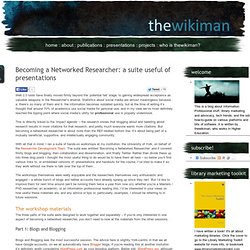
Statistics about social media are almost meaningless because a: there’s so many of them and b: the information becomes outdated quickly, but at the time of writing it’s thought that around 70% of academics use social media for personal use, and in my view we’ve most definitely reached the tipping point where social media’s utility for professional use is properly understood.
This is directly linked to the ‘impact agenda’ – the research shows that blogging about and tweeting about research results in more citations for that research, and pretty much everyone wants more citations. But becoming a networked researcher is about more than the REF-related bottom line, it’s about being part of a mutually beneficial, supportive, and intellectually engaging community. Information Services and Systems. Academic Use of Twitter #acadtwitter (with tweets) · professor_dave. How To Bring Academics to the Social-Media Party? Indirectly. 1.
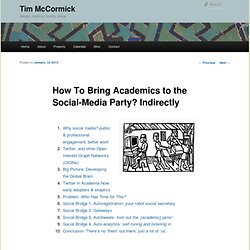
Why social media? Public & professional engagement, better work I admit: this might sound like the worst idea ever. Our harried guardians of truth, history, and scientific progress, called out to serve in the great Silicon Valley-born empire of the trivial. But as Steven Johnson suggested in his 2009 Time cover story, “How Twitter Will Change the Way We Live,” social-media (in his case specifically Twitter), often strikes people as an awful idea at first.
The one thing you can say for certain about Twitter is that it makes a terrible first impression. Steven Johnson 2009 cover story, “How Twitter Will Change the Way We Live” [note: "what I had for breakfast" is an established convention to mean "trivial social-media content"]. However, Johnson goes on to recount the transformative experience of attending a conference at which Twitter use turned the event into a realtime, global, open conversation. 2. “Behavior Graph” concept from Badgeville. Back to top 3. But I jest. 5. We have tools. The A to Z of Social Media for Academics. Social Media Sector Guidelines. Twitter and the law: 10 legal risks in tweeting from or to the UK. Number ten: defamatory tweets Defamation law protects a person's reputation.
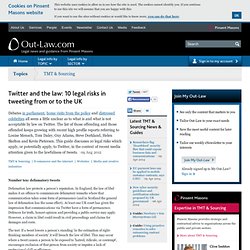
In England, the law of libel makes it an offence to communicate defamatory remarks where that communication takes some form of permanence (and in Scotland the general law of defamation has the same effect). At least one UK court has given the impression that communications via Twitter have a form of permanence. Defences for truth, honest opinion and providing a public service may apply. However, a claim in libel could result in civil proceedings and claims for damages and costs. The test: If a tweet lowers a person's standing 'in the estimation of right-thinking members of society' it will breach the law of libel. Number nine: harassing tweets UK law protects against harassment by means of the Protection from Harassment Act 1997. The test: Tweets which the 'reasonable person' would conclude cause alarm or distress may amount to harassment. The 10 most-useful social media tools of 2012 (so far)
I'm partial to roundup posts about the latest and greatest social media tools.
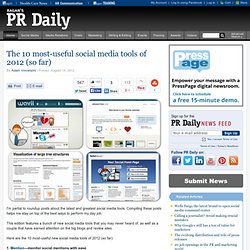
Compiling these posts helps me stay on top of the best ways to perform my day job. This edition features a bunch of new social media tools that you may never heard of, as well as a couple that have earned attention on the big blogs and review sites. Students warned social networking harms hiring prospects. Future Trends In Social Media. Social media is more than simply a marketing tool for academic research. According to Jeff Jarvis, author of Public Parts: How Sharing in the Digital Age Improves the Way We Work and Live, thanks to the internet, "we all have our Gutenberg presses and the privileges they accord.
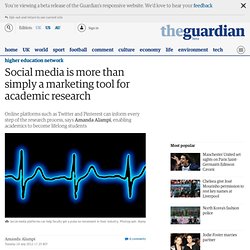
" For academic institutions, the internet is a largely untapped resource for shaping and sharing scholarly research. As with the Gutenberg press, maybe professors are worried about permanently penning their ideas into cyberspace. Others may worry about privacy, especially regarding social networking. But social media and the internet have transformative powers, allowing faculty to form powerful connections and reach new audiences that previously couldn't be accessed from the ivory tower. For the past year, I've been working with the faculty and research institutes at NYU's Robert F. One of the most important lessons I've learned is that social media is not just marketing for academic work.
Here's What Social Networks Know About You. A read through most online privacy policies is enough to make your stomach acid curdle.
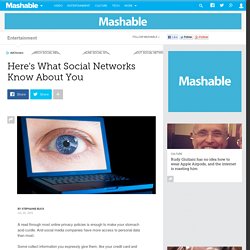
And social media companies have more access to personal data than most. Some collect information you expressly give them, like your credit card and telephone numbers. Others gather data based on how and where you use their services. This might include anything from device and browser information to location intel. And some of it gets really specific — think about your last search query or ad click. Depending on the type gathered, social networks use data to enhance location services and target advertising (now you know why that sunglasses website you visited three months ago follows you all over the web). SEE ALSO: Facebook Monitors Your Chats for Criminal Activity [REPORT] The infographic below, created for Baynote, explains why your web browsing and online interactions have become much more personalized.
Thumbnail image courtesy of Flickr, William Warby / feastoffun.com. 12 Essential Social Media Cheat Sheets. DOWNLOAD Twitter CheatSheet. Netskills: Web Essentials. Using social media to boost student employability. Universities have a responsibility to equip students to navigate around these channels which are used by employers in the recruitment process.
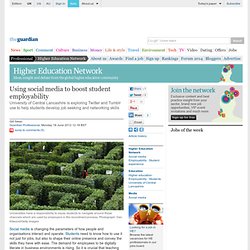
Photograph: Dan Kitwood/Getty Images Social media is changing the parameters of how people and organisations interact and operate. Students need to know how to use it not just for jobs, but also to shape their online presence and convey the skills they have with ease. The demand for employees to be digitally literate in business environments is rising. Mute noisy Twitter friends (for a while) - Muuter.com. Phil Bradley: Web 2.0. Web 2.0 tools in education : a quick guide. Twitterposter. Real Time Search - Social Mention. Don't be afraid to share#.TrLlr2CkL3o.twitter#.TrLlr2CkL3o.twitter. Social media allow users to share information about themselves and their interests.
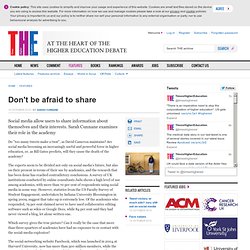
Sarah Cunnane examines their role in the academy Do "too many tweets make a twat", as David Cameron maintains? Are social media becoming an increasingly useful and powerful force in higher education, or, as Bill Gates predicts, will they cause the death of the academy? The experts seem to be divided not only on social media's future, but also on their present in terms of their use by academics, and the research that has been done has reached contradictory conclusions.